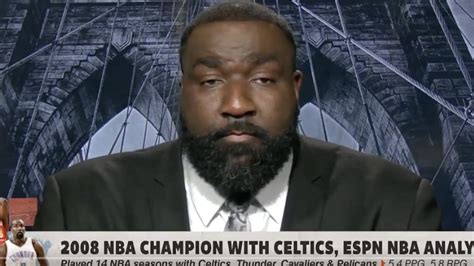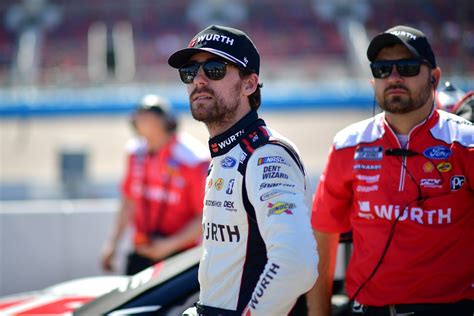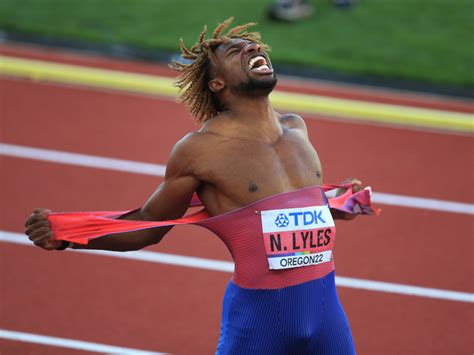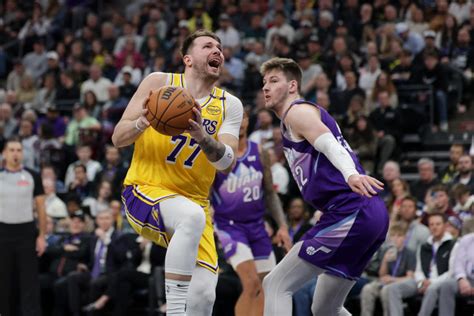
Kendrick Perkins, ESPN NBA analyst, publicly apologized for comments he made regarding race and NBA MVP voting, retracting statements that suggested race was a significant factor in Nikola Jokic’s MVP awards. The apology came after widespread criticism of his remarks earlier in the week.
Perkins issued the apology on ESPN’s “NBA Today,” acknowledging his flawed analysis and expressing remorse for the hurt caused by his words. “I want to apologize for generalizing when I was talking about MVP voting and for any hurt that I caused. I didn’t intend to, and I want to set the record straight,” Perkins stated. “I sincerely apologize to Nikola, his family, the Denver Nuggets organization, and anybody who felt offended by what I said.” He further clarified his stance, emphasizing that his intention was not to suggest that Jokic was undeserving of his MVP awards but rather to highlight potential biases in the voting process over the past several decades.
The controversy stemmed from comments Perkins made on February 20th, where he analyzed the historical data of MVP winners and implied that non-Black players had a different standard to meet compared to Black players. Specifically, he questioned the criteria used in awarding Jokic his back-to-back MVP titles in 2021 and 2022, suggesting that race might have played an unspoken role. “What do these guys have in common? I’m gonna just throw it out there. What do you think?” Perkins said during the initial broadcast, prompting immediate backlash from fellow analysts and viewers alike.
The remarks quickly drew sharp criticism from various corners of the basketball community. Many accused Perkins of injecting race unnecessarily into a discussion about basketball performance and achievement. Critics argued that attributing Jokic’s MVP wins primarily to his race was a disservice to his talent and hard work, as well as a dangerous oversimplification of a complex issue. Social media platforms became flooded with posts condemning Perkins’ statements, with many calling for ESPN to take disciplinary action.
Following the initial uproar, ESPN reportedly addressed the situation internally. While the network did not publicly announce any specific disciplinary measures, Perkins’ subsequent apology indicates that the gravity of the situation was recognized by both him and the network. The apology was seen by many as an attempt to mitigate the damage caused by his remarks and to reaffirm ESPN’s commitment to fair and unbiased sports coverage.
In his apology, Perkins emphasized that he had reflected on his comments and recognized the harm they had caused. He reiterated his respect for Jokic’s accomplishments and clarified that his intention was not to diminish his achievements. Instead, Perkins said he wanted to spark a broader conversation about potential biases in the league’s historical voting patterns.
The incident highlights the ongoing sensitivity surrounding discussions of race in sports and the importance of thoughtful and nuanced analysis. While conversations about potential biases are crucial for promoting fairness and equality, they must be approached with caution and supported by concrete evidence to avoid perpetuating harmful stereotypes or undermining the achievements of individual athletes.
Perkins’ apology was met with mixed reactions. Some praised him for acknowledging his mistake and taking responsibility for his words, while others remained skeptical, arguing that the damage had already been done. However, many agreed that the incident served as a reminder of the power of words and the importance of careful consideration when discussing sensitive topics.
The controversy surrounding Perkins’ remarks underscores the challenges faced by sports analysts in navigating complex issues of race, bias, and achievement. While the goal is often to provide insightful commentary and spark meaningful discussions, there is always a risk of inadvertently perpetuating harmful stereotypes or causing offense. In this instance, Perkins’ attempt to analyze historical voting patterns ultimately backfired, leading to widespread criticism and a public apology.
The incident also raises questions about the role of media outlets like ESPN in shaping public discourse on sensitive topics. As influential platforms with a wide reach, these organizations have a responsibility to ensure that their commentators are equipped to engage in nuanced and informed discussions about race and other complex issues. This includes providing adequate training, resources, and editorial oversight to prevent the spread of misinformation or harmful stereotypes.
Ultimately, the Kendrick Perkins controversy serves as a cautionary tale for sports analysts and media outlets alike. It highlights the importance of thoughtful analysis, responsible commentary, and a commitment to promoting fairness and equality in sports. While conversations about race and bias are essential for fostering a more inclusive and equitable environment, they must be approached with care and sensitivity to avoid causing harm or perpetuating harmful stereotypes.
The apology by Perkins represents an effort to course-correct and reaffirm his and ESPN’s commitment to these values. The long-term impact of the incident remains to be seen, but it undoubtedly serves as a reminder of the power of words and the importance of using them responsibly. It also underlines the continuing need for vigilance and critical thinking in discussions about race and achievement in sports.
Expanded Context and Analysis:
The controversy surrounding Kendrick Perkins’ remarks can be viewed within a broader context of discussions about race, representation, and bias in sports. Over the years, there have been numerous instances where athletes, coaches, and commentators have faced scrutiny for comments that were perceived as racially insensitive or biased. These incidents often spark intense debates about the role of race in sports and the challenges of navigating complex issues of diversity and inclusion.
In recent years, there has been a growing awareness of the importance of addressing systemic inequalities in sports and promoting greater representation for marginalized groups. This has led to increased scrutiny of media coverage, coaching practices, and organizational policies, with a focus on identifying and eliminating biases that may disadvantage certain individuals or groups.
However, discussions about race in sports can be fraught with challenges. There is often a fine line between raising legitimate concerns about potential biases and perpetuating harmful stereotypes or undermining the achievements of individual athletes. It is crucial to approach these discussions with sensitivity, nuance, and a commitment to fairness.
In the case of Kendrick Perkins’ remarks, the controversy stemmed from his attempt to analyze historical voting patterns for the NBA MVP award and suggest that race may have played a role in the selection process. While it is certainly valid to examine historical trends and consider potential biases, Perkins’ comments were criticized for lacking concrete evidence and for potentially undermining Nikola Jokic’s achievements.
The backlash against Perkins’ remarks underscores the importance of responsible commentary and thoughtful analysis. When discussing sensitive topics like race, it is essential to avoid generalizations, rely on credible evidence, and be mindful of the potential impact of one’s words.
Furthermore, the incident highlights the role of media outlets like ESPN in shaping public discourse on these issues. As influential platforms with a wide reach, these organizations have a responsibility to ensure that their commentators are equipped to engage in nuanced and informed discussions about race and other complex issues. This includes providing adequate training, resources, and editorial oversight to prevent the spread of misinformation or harmful stereotypes.
The apology by Kendrick Perkins represents an effort to course-correct and reaffirm his and ESPN’s commitment to these values. It is a recognition that his remarks were not only inaccurate but also potentially harmful. The long-term impact of the incident remains to be seen, but it undoubtedly serves as a reminder of the power of words and the importance of using them responsibly.
The controversy also raises questions about the role of sports analysts in general. While their job is to provide insightful commentary and spark meaningful discussions, they must also be mindful of the potential impact of their words on athletes, fans, and the broader community. This requires a high level of professionalism, sensitivity, and a commitment to fairness.
In conclusion, the Kendrick Perkins controversy is a complex issue with multiple layers. It highlights the challenges of discussing race in sports, the importance of responsible commentary, and the role of media outlets in shaping public discourse. While the incident has undoubtedly caused harm and controversy, it also presents an opportunity for reflection and growth. By learning from this experience, sports analysts and media outlets can work towards creating a more inclusive and equitable environment for all.
Frequently Asked Questions (FAQ):
1. What exactly did Kendrick Perkins say that caused the controversy?
Kendrick Perkins, on ESPN’s “NBA Today,” analyzed historical data of NBA MVP winners and suggested that race might have played a role in Nikola Jokic’s MVP awards. He implied that non-Black players might face different standards than Black players when being considered for the award. He questioned the criteria used in awarding Jokic his back-to-back MVP titles in 2021 and 2022. Perkins said during the initial broadcast, “What do these guys have in common? I’m gonna just throw it out there. What do you think?”
2. Why was Perkins’ statement considered controversial?
His statement was considered controversial because it was perceived as injecting race into a discussion about basketball performance and achievement unnecessarily. Critics argued that attributing Jokic’s MVP wins primarily to his race was a disservice to his talent and hard work. Many felt it was a dangerous oversimplification of the MVP selection process. It was seen as creating a racial narrative where one may not exist.
3. How did ESPN respond to the controversy?
ESPN reportedly addressed the situation internally, but did not publicly announce any specific disciplinary measures. However, Perkins’ subsequent apology suggests that the network recognized the gravity of the situation. The apology can be viewed as an attempt to mitigate the damage and reaffirm ESPN’s commitment to fair and unbiased sports coverage.
4. What was Kendrick Perkins’ apology?
Perkins apologized on ESPN’s “NBA Today,” acknowledging his flawed analysis and expressing remorse for the hurt caused by his words. “I want to apologize for generalizing when I was talking about MVP voting and for any hurt that I caused. I didn’t intend to, and I want to set the record straight,” Perkins stated. “I sincerely apologize to Nikola, his family, the Denver Nuggets organization, and anybody who felt offended by what I said.” He clarified that his intention was not to suggest that Jokic was undeserving but to highlight potential biases in voting.
5. What are the broader implications of this incident?
The incident underscores the challenges faced by sports analysts in navigating complex issues of race, bias, and achievement. It also highlights the responsibility of media outlets like ESPN to ensure their commentators engage in nuanced and informed discussions, and to provide adequate training and editorial oversight. The controversy serves as a reminder of the power of words and the importance of careful consideration when discussing sensitive topics to avoid perpetuating harmful stereotypes or undermining athletes’ achievements.
Further Contextual Details and Analysis:
The Kendrick Perkins controversy is not an isolated incident but rather part of a larger societal conversation about race, meritocracy, and representation in various fields, including sports. The discussion surrounding Perkins’ comments requires careful consideration of several interrelated factors:
-
The Nuances of MVP Voting: The NBA MVP award is a subjective recognition based on the opinions of a panel of sportswriters and broadcasters. These voters consider a range of factors, including a player’s statistics, team success, overall impact, and narrative. The relative weight given to each of these factors can vary from voter to voter, leading to debates about who is most deserving of the award each year. Given this inherent subjectivity, it is not surprising that discussions about bias, whether conscious or unconscious, often arise.
-
Historical Patterns and Bias: The history of the NBA, like that of many other institutions, is marked by periods of racial discrimination and exclusion. While the league has made significant strides in promoting diversity and inclusion, historical patterns of bias may still influence perceptions and decision-making, even unintentionally. Examining these patterns and their potential impact is a legitimate area of inquiry, but it must be approached with caution and a commitment to accuracy.
-
The Importance of Context and Evidence: When discussing sensitive topics like race, it is crucial to provide adequate context and support claims with credible evidence. Generalizations and unsubstantiated assertions can easily be misinterpreted and can perpetuate harmful stereotypes. Perkins’ initial comments were criticized for lacking sufficient evidence to support his implication that race played a significant role in Jokic’s MVP wins.
-
The Role of Sports Media: Sports media outlets like ESPN play a significant role in shaping public opinion and influencing the narrative surrounding sports. Their commentators and analysts have a responsibility to provide informed and nuanced commentary, avoiding inflammatory language and unsubstantiated claims. When discussing sensitive topics like race, it is particularly important for media outlets to ensure that their commentators are well-versed in the complexities of the issue and are committed to fairness and accuracy.
-
The Impact on Athletes: Accusations of bias or unfair treatment can have a significant impact on athletes, particularly those who have achieved great success. Nikola Jokic, as a two-time MVP winner, has earned the respect of his peers and fans for his exceptional talent and hard work. To suggest that his MVP awards were influenced by factors other than his performance can be seen as diminishing his achievements and undermining his credibility.
-
The Need for Dialogue and Understanding: The Kendrick Perkins controversy highlights the need for ongoing dialogue and understanding about race, bias, and representation in sports. These conversations can be difficult and uncomfortable, but they are essential for creating a more inclusive and equitable environment for all. It is important to approach these discussions with empathy, humility, and a willingness to listen to different perspectives.
-
The Responsibility of Public Figures: As a public figure, Kendrick Perkins has a responsibility to be mindful of the impact of his words. His comments can reach a large audience and can have a significant influence on public opinion. Therefore, it is essential that he exercise caution and ensure that his statements are accurate, well-supported, and respectful. His apology can be viewed as an acknowledgment of this responsibility and a commitment to doing better in the future.
-
The Evolution of Sports Commentary: Sports commentary has evolved over time, becoming more analytical and opinionated. While this can enhance the viewing experience and spark interesting discussions, it also increases the risk of making controversial or insensitive statements. Sports analysts must strike a balance between providing insightful commentary and being mindful of the potential impact of their words.
-
The Importance of Accountability: When mistakes are made, it is important to take responsibility and apologize for any harm caused. Kendrick Perkins’ apology was a necessary step in addressing the controversy and rebuilding his credibility. It also sent a message that ESPN takes these issues seriously and is committed to holding its commentators accountable for their words.
-
The Ongoing Quest for Equity: The Kendrick Perkins controversy serves as a reminder that the quest for equity and fairness in sports is an ongoing process. While significant progress has been made, there is still work to be done to address systemic inequalities and ensure that all athletes have the opportunity to succeed based on their talent and hard work. This requires a collective effort from athletes, coaches, media outlets, and fans.
Looking Ahead:
Moving forward, it is crucial for sports analysts and media outlets to learn from the Kendrick Perkins controversy and to adopt best practices for discussing sensitive topics like race. This includes:
- Providing adequate training and resources for commentators on issues of race and bias.
- Encouraging open and honest dialogue about these issues within the organization.
- Developing editorial guidelines for discussing sensitive topics.
- Holding commentators accountable for their words and actions.
- Promoting diversity and inclusion in all aspects of the organization.
- Fostering a culture of empathy and understanding.
By taking these steps, sports media outlets can play a constructive role in promoting equity and fairness in sports and in fostering a more inclusive and respectful environment for all.
The long-term impact of the Kendrick Perkins controversy remains to be seen, but it has undoubtedly sparked a valuable conversation about race, bias, and responsibility in sports. It is now up to individuals, organizations, and the broader community to continue this conversation and to work towards creating a more just and equitable world.
The situation also highlighted the rapid nature of social media and how quickly narratives can take hold. The initial clip of Perkins’ comments spread rapidly, fueling the firestorm of criticism. This underscores the need for immediate and effective communication strategies when controversies arise, both for the individuals involved and the organizations they represent.
Furthermore, the incident served as a stark reminder of the potential for misinterpretation and the importance of precise language, particularly when discussing sensitive and complex topics. The nuance of Perkins’ intended message was arguably lost in the initial delivery, leading to a widespread perception that he was unfairly diminishing Jokic’s achievements. This highlights the challenges of communicating effectively in a soundbite-driven media landscape.
Finally, the controversy brought to the forefront the importance of media literacy for consumers of sports commentary. Viewers should be encouraged to critically evaluate the information they receive, consider the context in which it is presented, and avoid jumping to conclusions based on incomplete or sensationalized accounts. The Kendrick Perkins situation offers a valuable case study in the complexities of race, bias, and the responsibilities of public figures in the modern media environment.









